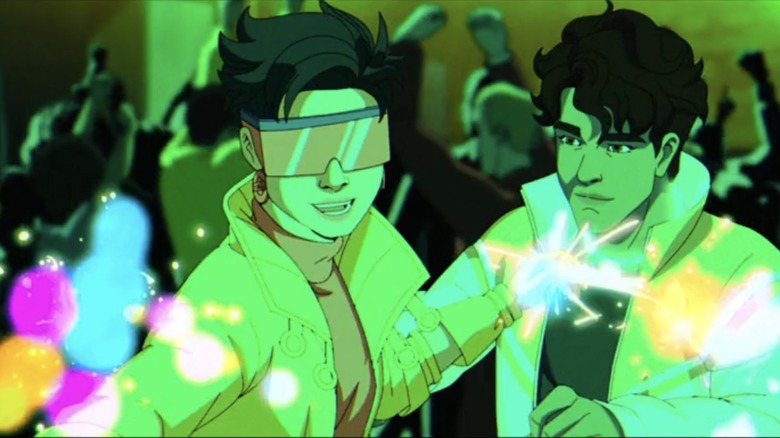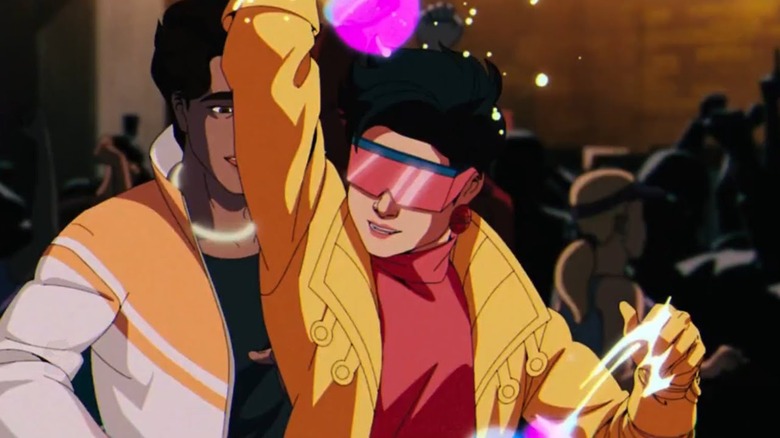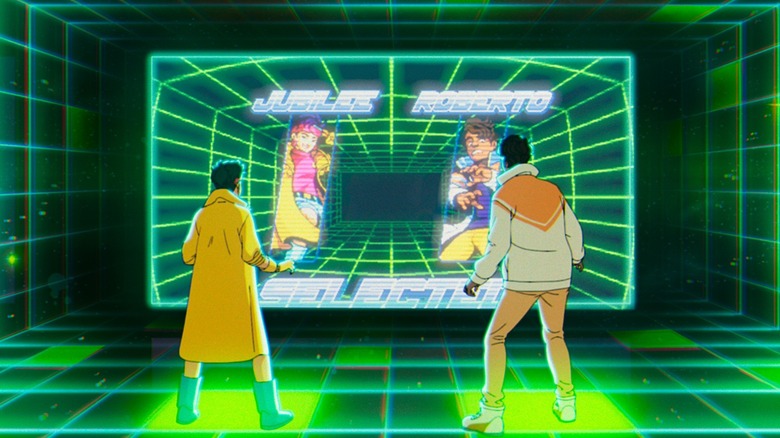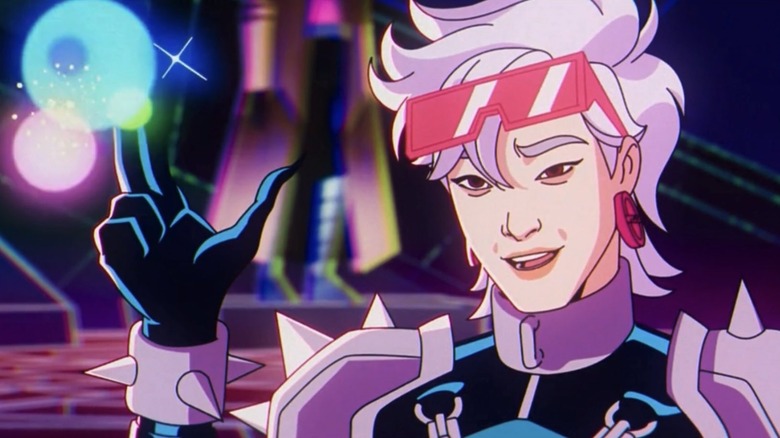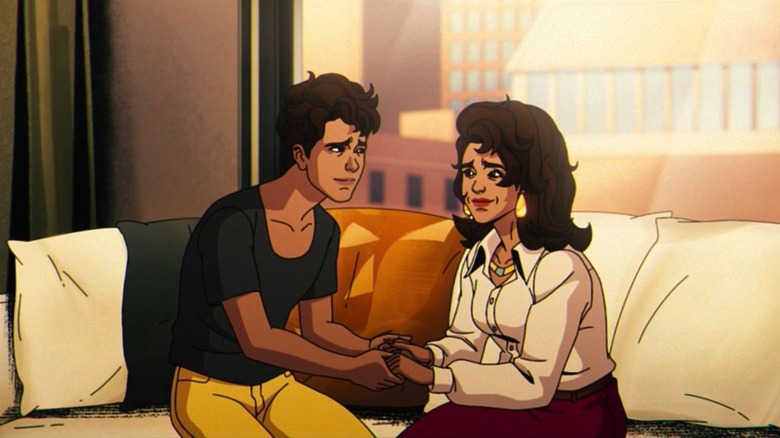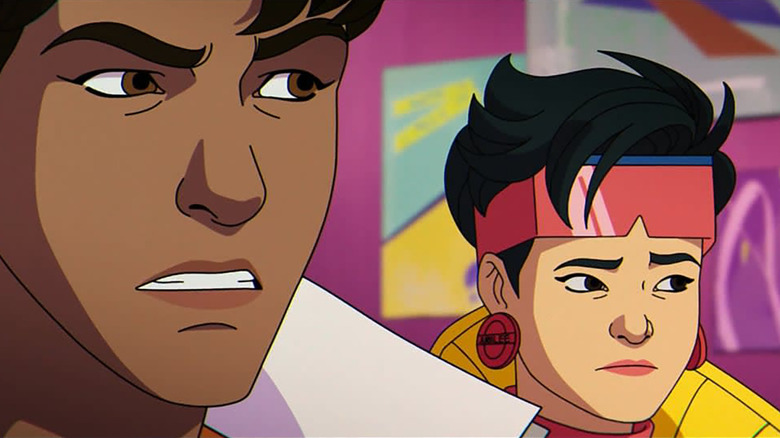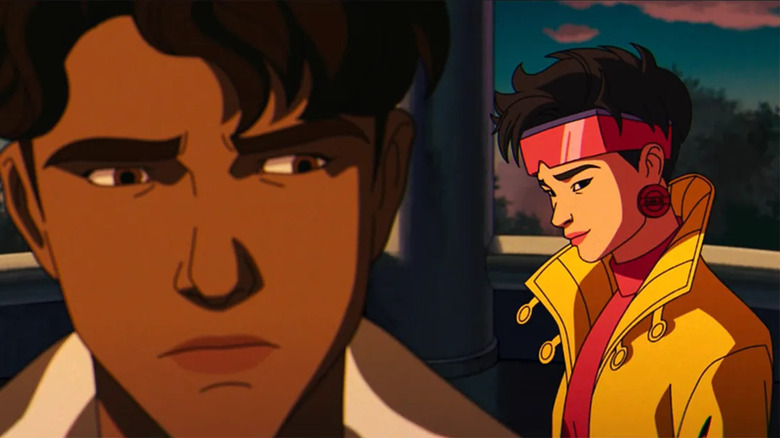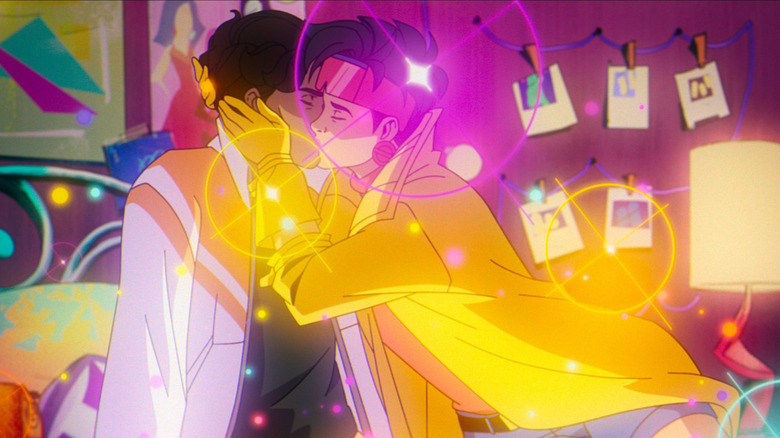X-Men '97 Voice Cast On How The Show's Righteous Anger Provides A Voice For The Voiceless [Exclusive Interview]
For superhero fans of a certain age, there was nothing quite like waking up early on Saturday mornings to tune in for a new episode of "X-Men: The Animated Series." With fast-paced soap opera storytelling, snappy one-liners, and the most radical animation style on TV, "X-Men: The Animated Series" was the perfect gateway to get kids hooked on all things Marvel.
Now, over 25 years since the original series went off the air, Marvel and Disney+ have continued the saga with "X-Men '97," a series so good that it's already being hailed as one of the best new shows of the year. What makes "X-Men '97" such a triumph is not just its perfectly executed nostalgia, but because the show has evolved to relate to the sensibilities of our 2024 world, without becoming anachronistic in the process. While the shocking genocide of Genosha in episode 5 is based on Grant Morrison's "E is for Extinction" comic book run from 2001, the conversations the characters have in the aftermath feel like they could have been ripped from any headlines between 2020 and today.
This allows "X-Men '97" to crystalize a message that has always been present since Stan Lee and Jack Kirby introduced the comic book team in 1963: The X-Men prove that the people the status quo marginalizes and mistreats for being different may very well be the only ones who can save humanity from itself. I recently spoke with Holly Chou (who voices Jubilee) and Gui Agustini (who voices Roberto Da Costa/Sunspot) to talk about playing the youngest members of the X-Men team and what it means to carry on the legacy of such a beloved series.
This article discusses plot points from "X-Men '97" and has been edited for clarity and brevity.
There's no superhero fatigue for X-Men '97
Over the last 15 years, superhero entertainment has been having a bit of a moment. But in the last year or so, there's been a lot of talk of "superhero fatigue." But I think "X-Men '97" is proof positive that's not necessarily the case, because the fandom is just as rabid for this show as ever before. I'm curious if both of you could comment on what you think it is that makes "X-Men '97" so special and allows it to escape these accusations of superhero fatigue.
Chou: So as a rabid fan myself, there's never a bad time to bring back this thing that we loved so much from when it was on, for those of us that it hits with. For all the new fans that are coming in, I feel like what they're seeing is our show is so different and our show is, I feel, going places that either the original series wasn't allowed to go to at that time and that the more recent sort of forays into superhero-dom just also offer something different. So different and so necessary and so unique and special.
Agustini: I 100% agree. I just also think that the writing has been so incredible. I mean, everything obviously that's been coming with the show is just so, so strong that I think it's been this hit because it's hitting such a broad, vast age range that's marvelous. So I think that's why we're not we're like, "Oh, this is reviving everything" and giving a bit of, not hope — there's hope because [many of those other superhero projects have] been fun — but I think it's just a different level that's happening right now.
The power of youth for Jubilee and Roberto Da Costa
I love that you brought up the age range because both Jubilee and Roberto Da Costa are the youngest of the group, and I think you can definitely hear that in both the optimism and annoyance with adults with Jubilee and sort of this cocky, rebellious streak in Roberto. The very teenage [attitude of], "I'm invincible. You can't tell me what to do." So I'm curious how you both channel these very distinctly teenage energies into your performances despite not being teenagers anymore yourselves.
Chou: For one thing, I'm very immature, so that helps. [laughs] I mean, I feel like it's so relatable at any age, though, even if you're 60-something. I feel like there's something in you that connects with being the baby of the group or not being taken as seriously or being sort of sensitive and feeling the need for that kind of protection. I'm guessing that you've seen the most recent episode?
Oh, yes. Absolutely.
Chou: Watching, the thing that struck me that did not leap out to me at the time on paper [but did] when I was watching it, I was so just grateful on Jubilee's part that she has somebody to lean on during this immediate post-tragedy time. Because Jubilee's been sort of like leading Roberto along, sort of as the replacement Jubilee, the new, fresh face. But to have somebody that's her age — first of all, there are no other students in this iteration that are Jubilee's age. It's not filled with other students that are teenagers that are on the cusp of young adulthood and that sort of thing. So to have somebody else that's just a peer, first of all, is such a gift. And then to have somebody to lean on that, it's a given. She can literally lean on him and take his hand for him. And for her, you know? Anyway, I don't know if that answers your question about the age, but it's just nice to have.
Agustini: It is so beautiful and nice, right Holly, because I also feel like it's different if Jubilee were to lean into you know Wolverine, for that matter, like an uncle or something.
Chou: Well, she does.
Agustini: Well, for sure.
Chou: Yeah. It's just a different kind of, I don't know, comfort.
Agustini: Yeah. And for me, I feel myself as a teenager a lot of the time anyway. Hopefully just with more maturity. [laughs] But even the way I vibrate or even my voice at times, I'm naturally just more into the lower 20s and below the 20s. And in general, I think it lives a lot in me. So, it was super fun to really have to just tap into that. In fact, from the beginning, I was like, "Let's not make it at times like him [seem] so young. It's a mature show. So you can, like, just make it more mature, even." I was like, "Oh, okay." So it was a little bit of that battle.
Chou: There's a good point about, I think something that you just said hinted about you just having that within you, that sort of teenager side. And this is the thing: Every person who watches the show at any age — I mean, unless you're actually a child — but the older viewers, the former fans, we've all been this age. We haven't been the age yet of some of the older cast members. Certainly, nobody's the same age as Wolverine and has been through those things. [laughs] But yeah, whether you're that age or not now, a lot of our viewers have been through that and remember it and relate to it.
A passing of the torch for Jubilee
Yeah, definitely. And I especially think a lot of the core audience is younger Gen X or millennials. And I think those generations have been sort of trapped in this arrested development because capitalism has made it really hard for us to be adults.
Chou: Absolutely. Yeah.
Holly, at the start of the series, there was so much praise that you were taking over the role of Jubilee, even though obviously we love Alyson Court, we love her performance. But this is the right call to make. But then in episode four, you got to act with her. So what was that like?
Chou: That was amazing because we haven't, just the nature of how production is, we don't get to a lot of face-to-face. We don't get to meet the other actors a lot of the time. And it was actually just impressive that I saw that the move had her approval and that she had been the first to say "I'm actively stepping back and it's time to send the elevator down for somebody else," you know? So that already is — not that you need permission, but it's nice to know that you have someone's blessing or things like that.
And then the team would pass along very kind things, very generous things that she said in her sessions if she had heard playback from my recordings or anything like that. So she said very approving things, and that's just that's heartening. And then to actually get to be in the episode together and share the role, I mean, we're sharing this role forever. We're part of the Jubilee gallery now. But to actually get to be in the episode together and act even though we didn't get to record together or anything like that, that's so amazing. The phrase "passing the torch" gets bandied about a lot. But there's something about passing the torch, but it's also something about having both of our hands on the torch at the same time.
Absolutely. Yeah. I love that.
Agustini: And BJ, just for your listeners [and readers], Holly is so, so wonderful, that she put together this watch party with a lot of cast members and the crew and she FaceTimed with Alyson so she could watch it together. That's such a beautiful moment. It was really, really extraordinary.
On Roberto's big moment in episode 7
That makes all of my core fangirl feelings just explode with fireworks in my body! So Roberto had a huge moment in the most recent episode in finally telling his mom, "Hi, I'm a mutant," which, as she reveals, she's always known. And I think that if you change just a couple of words in this, this could have been a coming-out moment in any other show. What sort of conversations were had in preparing for that scene in particular?
Agustini: Oh, interesting. I mean, no conversation in particular. I think obviously knowing it was such a big moment, I don't recall in the session if there was anything specific, but I just knew it was such an important moment. The sessions are always like, it's trial and error in a way. We're trying different versions, different emotionality, which is a wonderful experience for me as an actor, I think for all of us, because we get to do the lines and the moments so many more times. But I think it was just so important to connect to that part of[me] that's so nervous that I've had so many times in my life. Not in something like this, but oof, many a time. So just finding those moments within me to then portray this important moment.
Oh, definitely. And especially when you're young, a lot of these big feelings are the biggest feelings that you've ever had before. And I think you portrayed that just beautifully.
The X-Men allow outsiders to feel seen
This next question is for both of you. Something that I've always appreciated about X-Men is that the mutants have always existed as an echo for anyone in real life who is marginalized by the status quo. But "X-Men '97" really gives these characters the space to show righteous anger toward a society that treats them not just unfairly, but with bigoted violence, which is something that, unfortunately, a lot of people, myself included, do relate to. So I'm curious if you both could speak on what it's like to give a voice to characters who are a part of this team, who are often saying the things that so many of us wish we could say, but sometimes feel like we might not be able to, for whatever reason.
Agustini: First of all, it's just such a great honor to just be part of this in general, but in that specific point, it's just really wonderful because I think it is an opportunity that we're all having to see yourselves reflected in that way and those things that we maybe can't say or can't express or actually don't feel like we can, because I think we all should have that safe space to go through our feelings. So that's the beauty of art, and in this case, television, that you can see yourself reflected in a way and expressed, and then you can go through the emotions together with these characters. So, to me, it's just such a great honor. And I think the creators are doing it beautifully, and it's being so well-portrayed and thankfully very well-received by our viewers.
Chou: Absolutely 100%. I want to echo what you said about that being the whole point of art, right? Art is what expresses [...] There's a play called "The History Boys," and there's this history teacher — he's not just history, he's teaching sort of like everything — but he says there's something about coming across something in writing — and I'm just going to extend that to art or, you know, entertainment or something like that — that you thought was just for you, like that you were the only person who ever experienced this. And when you read it or see it, you realize that somebody else has been through that, too.
And a lot of the fans, a lot of the people who are coming up to us at, wherever, conventions or something like that or just messaging, [they're saying] it's not just whoever created or wrote that thing that has been through the same thing. It's so many people. It's so many more people than you would ever have expected that this is for, as it turns out. I don't want to speak for the writers, obviously, Beau DeMayo, the prevailing voice through all of this whole show, it's his vision, it's his voice. But also the team of other writers. This episode was by J.B. Ballard and Charlie Feldman. And you can tell that they have poured their experiences and their heart and soul into this. Oh my God, so many conversations in this episode alone. The conversations between Roberto and Jubilee and his mother, and then Beast and Trish Tilby. What an important conversation there. And so gratifying. I mean, you asked what it was like for us to be able to be part of this expression of this conversation. And it's so gratifying to get to help to share this message.
The responsibility of representation in X-Men '97
I think you really nailed it when you were saying, it's not just one person. It can be for everybody. Because there's such great writing in this show that you watch these situations and it can be read as like, "Oh, this is speaking to racism. Oh, this is speaking to homophobia or transphobia or ableism" or whatever — like add an "ism," it can speak to all of it. And that is such a hard thing to do, where the more specific the show gets, the more universal that it feels.
Chou: Absolutely. That's the rule.
Which is why I think so many people hold the X-Men so sacred after all these years. Because I know for me, especially, watching the original series as a kid ... the expression "feeling seen" gets thrown around a lot, but it is true. Like, absolutely. I still have a single-colored streak in my hair because I love Rogue. It's maybe not white, but that's part of it. And so being able to tell these stories, something you said earlier, Holly, in ways that the original series wasn't allowed to at the time. I'm curious if you could speak to that as well, where these stories have always been at the heart of the X-Men, but now it's allowed to be a little bit more explicit. So what is that responsibility like for the two of you?
Chou: I would say, just speaking only for myself, I feel like the people who really have to be brave — because we're just actors. We don't come in until very late in this stage. So really, I feel like it has to go to the writers and creators. It has to go to Beau, it has to go to JB [Ballard], it has to go to Charley [Feldman]. It has to go to Emi [Yonemura] and so many other writers that I'm not naming. But those people who are making themselves very vulnerable and in some ways they're sharing their coming out stories and stuff like that, but also putting it into the media like this and putting it into art and putting it out for the world. That's a whole other kind of coming out. You know, multiple comings out in one lifetime.
Agustini: It's the reason why it's just so brilliant. I keep coming back to this word, brilliance. It's really genius-like, because we talked about the age range, how it's been reaching a broad range. But then also the themes, the amount of themes that are so deep and profound. It was beautifully said, BJ, about how the more specific it gets, the more universal it gets, which is very hard to do. So I agree with Holly. The responsibility was huge. But I've been saying for me, I've been so surprised.
When I got it and what I talked most about is like, it's a Brazilian character, it's like Latin representation that was also so huge and so important. And I'm so honored in that sense. To me, I was preparing and I wanted to give obviously my best performance, but like the justice to the representation of my country and this first Brazilian superhero that Marvel created. But I just did not expect this huge hit that it's been and the impact it's been having. I am just so surprised, and positively so, by that whole representation or like you said, people coming to me or writing to me on Instagram like "I'm being seen, oh, how great to see a Latin in the show" and all these things that I was not foreseeing.
On becoming Jubilee and Sunspot for a new generation
The superhero characters are characters that have such longevity. They've been around forever. But once you've played these characters, you become that character for a group of fans. I know this is a Marvel property, but it's like the "Michael Keaton is my Batman" kind of thing. So what is it like for the two of you to know that moving forward for people watching now, but also people who will continue to discover "X-Men '97" as the years go on, that you are their Sunspot, you are their Jubilee? What does that feel like for you as a performer?
Agustini: I would say very briefly and simply, it's truly an honor, and it's still — and I think it'll be maybe forever — surreal. Really.
Chou: It's fantastic. [laughs] But it's also, you become one part of a full legacy. [In the Michael Keaton example], there's Michael Keaton, and there's also Kevin Conroy. It's a family of Batmen. In the same way, there are now multiple Jubilees. We're the only ones to voice Jubilee, but there have been little cameos that people were very excited to see by Lana Condor or whoever in the movies, and then not to mention the full canon of 60 years worth of comics. I mean, she wasn't in all 60 years, but the comic book versions, like the Jim Lee Jubilee is not necessarily the same Jubilee that I'm voicing and that Alyson [Court] voiced. We are this family of Jubilees in sort of the same way that the Spider-Verse movies have come out and they're so great, but it's that sort of thing of "You don't have to do it alone. You're not by yourself. You're one very unique portrayal in this entire multiverse, cavalcade of family."
Beautiful. Well, that is the time that I have with you both today. Thank you so, so much for talking with me. And congratulations on such an incredible show. I am so stressed out about what's going to come next. I don't know if I'm emotionally prepared. [laughs]
Chou: Oh, by the way I remember what I wanted to say earlier. It was just that story about the coming out thing. I've already told you this [nods to Gui], but my friend, after the first episodes dropped, texted me saying that he cried when Roberto said that thing about not being out to his parents.
Agustini: It's one of my favorite scenes, by the way. It really is, because it becomes very, very funny right after. It's wonderful.
Interviewer: I didn't cry, but I definitely had the deep breath of like, "Oh, I remember that feeling!"
"X-Men '97" is now streaming on Disney+ with new episodes released on Wednesdays.
